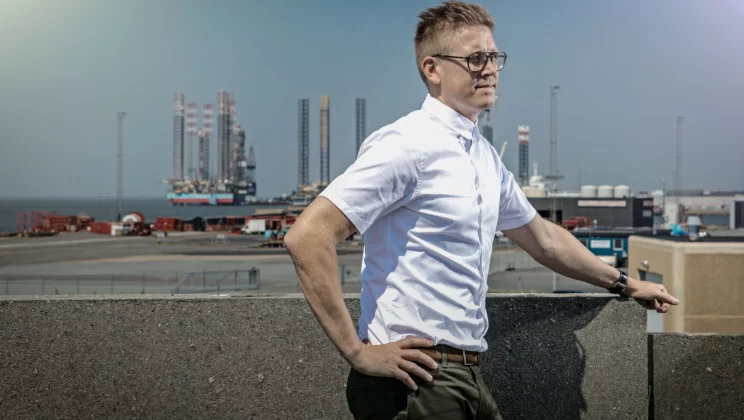A walk at the port and a New Year's reception with 1,200 Esbjerg citizens convinced DSV Branch Manager Morten Landry that the company should base itself firmly in Esbjerg. "It is the area of Denmark with the greatest potential," he says.
Shortly after the New Year, Morten Landry took a trip to the Port of Esbjerg. Although hailing from West Jutland, he had not been there for 15 years. He was almost shocked. Morten Landry's last memory of the port was from a Christmas lunch in 2002, where he sat looking out of the window at a couple of cars, a ferry to England and an old restaurant.
"Now I was looking at turbine towers, oil rigs and giant cranes. It is completely crazy. Everything is 20 times bigger," he says.
Morten Landry is Branch Manager at the world's fifth-largest transport company, DSV, which has just expanded its presence at port of Esbjerg, and has established a department for air and ocean freight.
One reason for that is Morten Landry's walk at the port in January.
"The big companies at the port have international status. Siemens and Vestas are there, and the city now has a lively café street scene. People have come out of the woodwork," he says.
As an outsider, he feels that Esbjerg is full of people who are united in wanting something more.
"Esbjerg is developing at an incredible rate," says Morten Landry.
Local anchoring
DSV has been in Esbjerg for a number of years with offers of road and refrigerated transport, repair shops, automobile inspection stations and services, car wash and several other features. But the idea is that the many air and ocean freight customers in Esbjerg can now gain local access to DSV’s global network.
"In our view, Esbjerg is the area of Denmark with the most potential," says Morten Landry, branch manager of the DSV’s 100-strong air and seaports department in Horsens.
In Esbjerg, DSV will help the local business community to finetune its supply chain, both nationally and internationally. The company is represented in more than 80 countries and has 45,000 employees worldwide.
"We want people in Esbjerg to have local access to our global network when their aluminium, iron or anything else needs to be transported. We are not here only to make oil or gas," says Morten Landry.
His office in Esbjerg now is exactly the same office he occupied when very young and apprenticed to the company Roland Munck, which was subsequently acquired and is now a part of DSV.

Morten Landry is very optimistic about the developments at Port of Esbjerg.
1,200 for finger food
If there was any doubt in Morten Landry's mind about DSV's investment in Esbjerg, it was eliminated completely when he attended the New Year's reception at Musikhuset. 1,200 locals showed up here for a pint and finger food.
"I couldn't help but think that if the business community provides the city with this kind of backing, it is proud of its city and united in wanting to build something up. It was also a good indicator that we cannot sit in Copenhagen or Aarhus and believe that we have any status in Esbjerg unless we meet people at eye level," he says.
DSV already works closely with major international companies in Esbjerg, and they are not so bothered about where you are based.
"But small and medium-sized companies need you close by so we can understand their requirements."
Excellent start
From 4 May, DSV has therefore had four people based at the port, taking care of air and ocean freight primarily. This means there are now a total of 140 employees at the port. And the beginning has exceeded all expectations. The majority of businesses in Esbjerg would like to be managed from the local office instead of Horsens, and at the same time, a number of new customers have emerged.
"The subsidiarity principle has been a greater success than I dared hope," says Morten Landry, who also therefore has the courage to set the bar for expectations high.
"We must grow organically, but my personal expectation is that there will be ten people sitting in the office in three years' time," he says.
Go to overview

